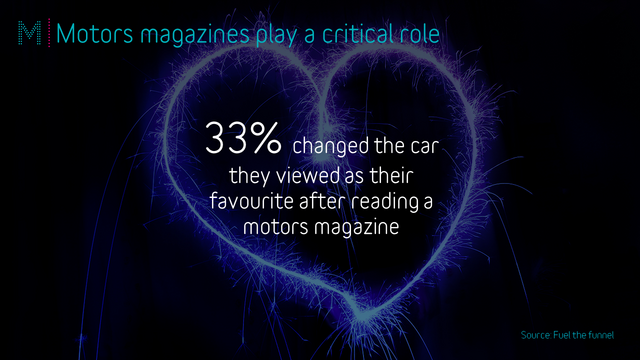Clearly, the automotive industry has not forsaken traditional media buys in favor of an all-digital presence. Just spend 15 minutes watching any sporting event on TV and that becomes quite obvious.
But what about magazine media; is this still important in the world of automotive sales? According to a recent report from Magnetic, magazine brands have a significant role in the automotive customer journey and a direct impact on the bottom line.
“Historically, magazines have been used by motors advertisers as vehicles for brand building and our research confirms that magazines have a very important role to play in building perceptions for advertisers,” notes this article in Magnetic.
That role remains important, even as many brands take a much short-term view on ad metrics.
The risks of short-terming in the auto customer journey
The Magnetic article gives a great description of the problem of “short-terming” that’s been afflicting brand marketing strategies. Magnetic raised this issue last fall when they offered a report on the phenomenon, in which short-term metrics like CTRs and social results become the focus for an organization.
“Short-termism is a threat to marketing effectiveness and shareholder value,” the report begins. It explains that CEOs are often reluctant to embrace long-term strategies because of pressure to show immediate results.
The problem, as the report notes, is that magazine media is “closely associated with delivering long-term results.” If the emphasis is on short-term “activation” results, marketing is aimed at immediate conversion. But that fast activation is not so easy without the long-term benefits of brand awareness.
The case for magazine media in the long and short-term
A short-term approach is contraindicated for the auto industry. The first stage of the automotive customer journey often begins months ahead of the actual purchase, and this is when it’s most crucial for brands to be making the emotional connection to buyers. The traditional way to do this has been in glossy magazines, and the results have been solid.
“On average 45 percent of respondents changed their perception of a motoring brand after reading a motoring magazine,” Magnetic notes. “For every single brand attribute we gave people – be it safety, fuel efficiency, affordability, or environment credentials, reading a motoring magazine changed perceptions.” One reader in three actually changed the car they considered their favorite after reading a print motor magazine.

That’s not to say that magazine media doesn’t have a solid impact on short-term metrics too. Beyond the brand building and emotional connections, traffic driven by magazine media is “significantly more effective than other traffic with a 74 percent increase in car configuration and a 120 percent increase getting visitors to book a test drive,” the report notes.
What automotive brands are finding, according to Magnetic, is that magazine brands do indeed improve short-term activation as well as long-term brand building.
“Peter Field, renowned for his work with the IPA, shows that using magazine media (in print or online) delivers a 30 per cent uplift in activation metrics,” the article continues. “This is generic data across categories and here activation refers to a number of metrics, web visits, trial, search and click-throughs.”
In a marketing world consumed with short-term results, the bottom line of this research is significant, and “showed that magazines with editorial mentioning a car brand combined with advertising from a car brand had an even greater impact on purchasing times, moving purchase forward by five months as compared to two months in magazines without ads.”
It all comes down to knowing your customers and how they buy: In the automotive customer journey, magazine brands shorten purchase cycles, get consumers to spend more, and amplify the effects of all other advertising channels.
Even with a focus on short-term metrics, brands can no longer overlook the impact of print in the customer funnel, especially in a long customer journey like the one most auto buyers take.
